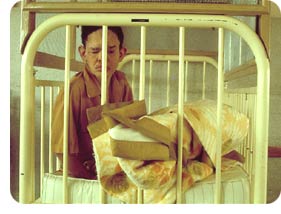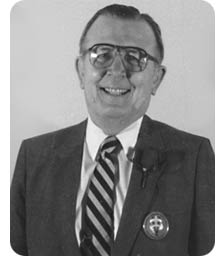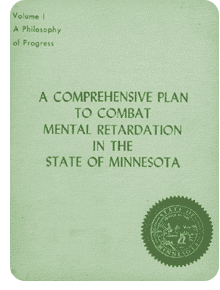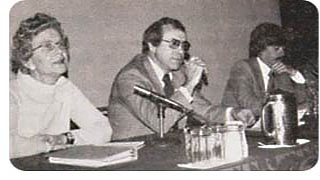1960s: Building the Momentum
Bengt Nirje of Sweden Visits Minnesota State Hospitals
An international authority on disability issues, Bengt Nirje of Sweden visited Minnesota state hospitals in 1967 before meeting with Governor Harold LeVander.
Nirje preached the "normalization principle," already successful in Scandinavia. This principle urged that people with developmental disabilities receive the same level of housing, schooling, and medical care provided for all other people.
Calling some Minnesota hospital conditions "horrible," "inhumane," and "impersonal," Nirje observed that he had witnessed "new means of degrading people" during his visits.

Swedish expert Bengt Nirje found Minnesota institutions "horrible" and "inhumane."
The Arc Continued to Act as Advocate

For decades, Arc was one of the state's most vocal and effective advocates for people with developmental disabilities.
Arc continued to act as advocate for people with developmental disabilities, testifying before the Legislature that it was time to resolve the future of Minnesota's state hospitals once and for all.
At the hearings, witnesses outlined the need to reduce overcrowding. They also noted that current proposals to regionalize services neglected to discuss what happens to the residents currently living in Minnesota's state hospitals.
Attorney Mel Heckt

Mel Heckt
In 1968, attorney Mel Heckt led a group of 11 judges, lawyers and law enforcement officials in drafting statutes protecting rights for people with developmental disabilities.
The Arc identified a legislative agenda that emphasized rights for people with developmental disabilities. The organization felt this emphasis was necessary before community services could be expanded.
A Comprehensive Plan

Minnesota developed an aggressive plan that took advantage of increased federal funding.
Keeping pace with Minnesota's accelerating efforts, federal programs also were expanding. In 1968, a federally-funded planning effort recommended:
- Mandatory PKU testing,
- Behavior modification,
- More sheltered workshops and day programs,
- Additional federal funds for education in state-run institutions.
Mandatory PKU testing began in 1968 with 171,066 tests run over an 18-month period. Overall, 11 newborns were diagnosed with disabilities.
The First State Program Office

Ardo Wrobel (center) headed the State's first program office for mental retardation.
The first state program office was created in November 1971.
Headed by Ardo Wrobel, the office was responsible for designing, organizing, and executing state programs. Counties would continue to implement the programs locally and care for the people impacted by them.
Project EDGE

Preschoolers with Down Syndrome benefited from Project EDGE, an innovative education program.
A break-through program called Project EDGE was introduced in 1969 at the University of Minnesota. The program was created to teach children aged three to five years of age with Down Syndrome.
Led by Professor John Rynders of the University of Minnesota, Project EDGE — which stood for Expanding Developmental Growth through Education — was federally funded.
Video: John Rynders, Professor, University of Minnesota, describes the innovative Project EDGE on Down Syndrome he directed.







